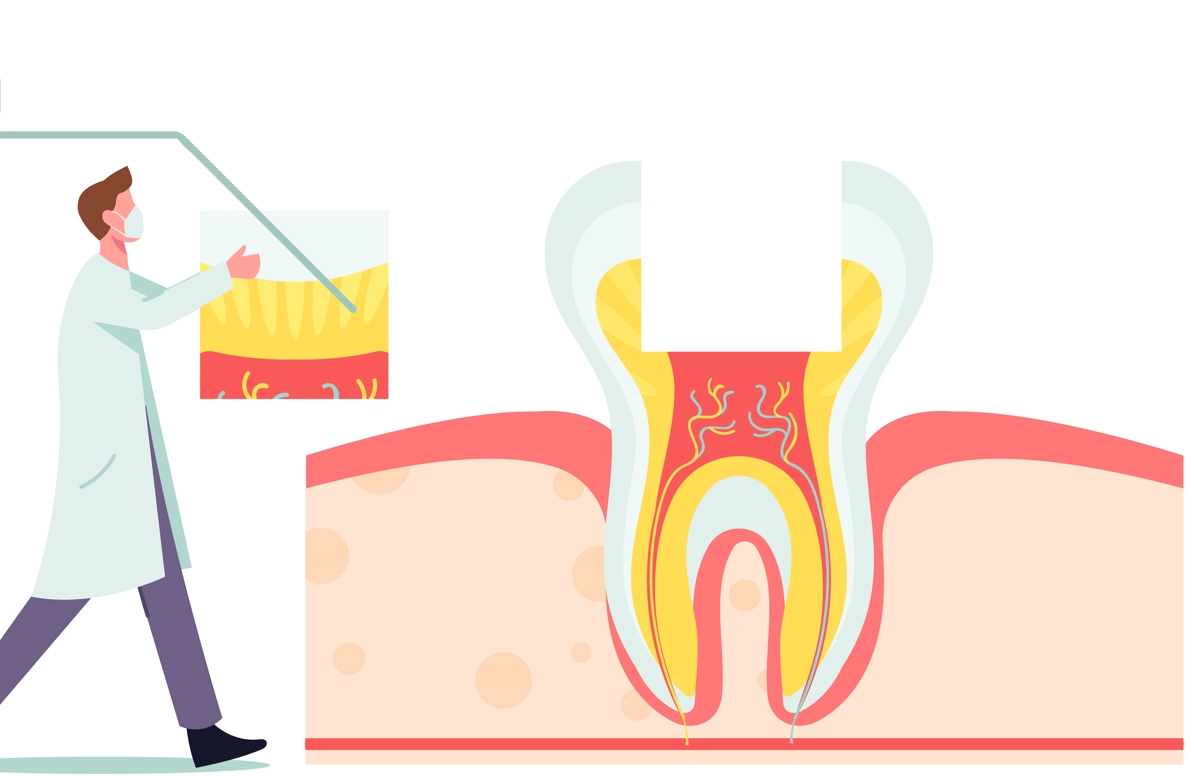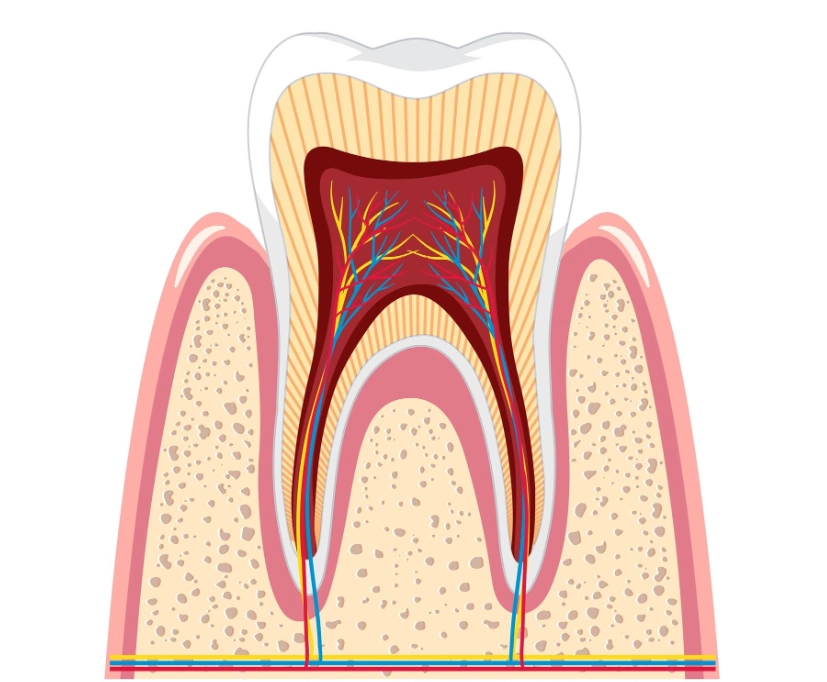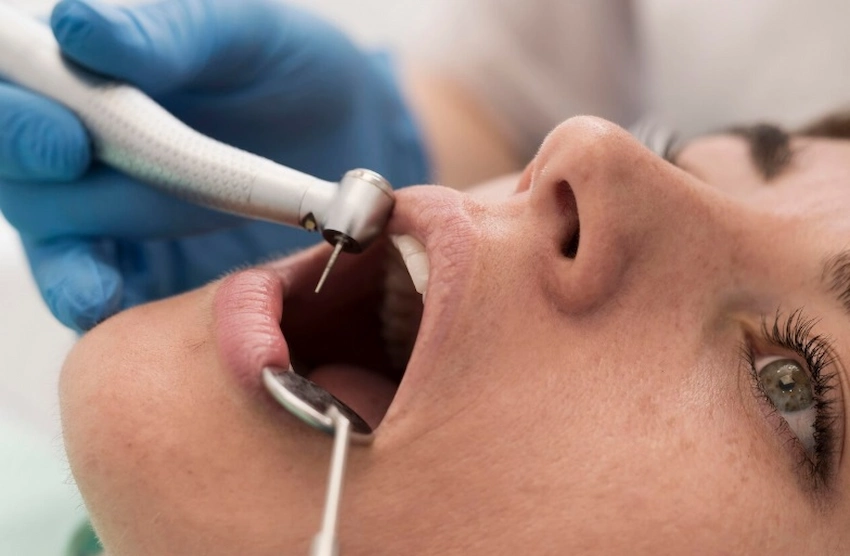🦷 What is a Root Canal Treatment?

Root canal treatment, often called endodontic therapy, is a dental operation to rescue a tooth with severe decay, infection, or injury. If the pulp, which is the soft tissue inside the root of your tooth, is irritated and infected due to deep decay, repeated dental procedures, bad crowns, or a crack in the tooth, a root canal treatment is needed to eliminate the damaged pulp.
Generally, rather than pulling the tooth, the dentist removes the infected tissue inside the root canal, disinfects the remnants, and fills it with biocompatible material. Later, the tooth is covered with a crown to regain its natural appearance and strength.
The root canal treatment does the following:
- Relieve severe pain caused by infection and inflammation
- Prevent the spread of bacteria to the neighbouring teeth and gums
- Retain the integrity of your natural tooth structure to maintain good oral health in the long term
What Causes Root Canal Treatment?
A pulp is infected or inflamed, which means a root canal treatment must be performed. The pulp contains nerves, blood vessels, and connective tissue, which help the tooth grow during development. When the tooth has completed its growth, it is possible that the tooth can survive without the pulp; therefore, it can be removed when the pulp is problematic.
1. Deep Tooth Decay (Cavities)
If the decay has not been treated in time, the bacteria reach the tooth’s deepest core, and complications like pain, swelling, and sometimes an abscess may occur.
2. Cracked or Chipped Teeth
Initially, a small fracture or chip might be insignificant; however, it is a loophole for bacteria to access the pulp in the case of a deep crack, especially when the crack spreads to the pulp chamber of the tooth.
3. Repetitive Dental Procedures
The same tooth, having undergone several restorations, for instance, fillings, a crown, and drilling of the teeth, can cause the pulp to be irritated and inflamed.
4. Trauma to the Tooth
When not visible, but a sudden impact (for instance, a sports injury or fall) is enough to traumatize the pulp and might result in a root canal needed later.
What Does a Root Canal Do?
A root canal procedure completely removes the source of your infection and allows your tooth to return to its natural state. Here is a summary of what happens during the root canal treatment:
Step 1: Diagnosis
The dentist takes digital X-rays and conducts some tests to decide whether the pulp is infected or dying. If the dentist recommends a root canal, then you will get a local anesthetic to prevent pain in the treatment area.
Step 2: Access to the Tooth
A small opening is drilled in the crown of the tooth to gain access to the pulp chamber and root canals.
Step 3: Cleaning and Shaping
By using certain tools, the dentist opens up the tooth, takes out the pulp, and then cleans and smooths the inside of the tooth to prepare for filling.
Step 4: Filling the Canals
Once the cleaning process is finished, the dentist fills the empty canals of the tooth with gutta-percha. This substance has a consistency like rubber and is used to prevent the canals from being reinfected.
Step 5: Sealing and Restoration
The hole is filled with a temporary or permanent filling. In most cases, the dentist will place a dental crown over the tooth at a later appointment to secure it and use it to reinforce the tooth.
Root canal perks:
- Ends the source of infection
- Takes away the toothache
- Brings back chewing capability and normal function
- Curtails unnecessary teeth loss
What Does a Root Canal Feel Like?

One of the common misunderstandings about root canals is that the pain is unbearable. However, in fact, contemporary root canal procedures cause almost no pain, and they are just as uncomfortable as getting a routine filling done.
During the procedure:
- Local anesthesia will keep the pain at bay
- You could sense a little pressure, vibrations, or minor sensitivity
After the procedure:
- There might be a mild soreness or tenderness for several days
- If at all required, pain can be reduced by using over-the-counter painkillers such as ibuprofen or acetaminophen
- In general, any discomfort will disappear within 3–5 days
To tell you the truth, the discomfort that usually comes with the endodontic therapy (from the infection) is usually far from what is felt during or after the treatment.
What Can I Eat After a Root Canal?
Being extra careful with the choice of foods that you consume comes under post-root canal care, as it avoids tooth trauma and promotes healing.
Right after the procedure:
- It is advisable not to eat until the effect of anesthetic drugs wears off, meaning when the numbness is over
- Stick to soft, cold, or lukewarm foods
Ideal food options:
- Mashed potatoes
- Smoothies and shakes
- Scrambled eggs
- Yogurt and applesauce
- Oatmeal and soup
- Steamed vegetables
- Soft pasta or rice
Foods to avoid:
- Anything very crunchy or solid (e.g., nuts, raw veggies, hard bread)
- Sticky candies or chewing gum
- Highly hot or spicy foods
- Sugary treats (to prevent new decay)
Also, if a temporary crown is in place, make sure to chew on the side of your mouth that doesn’t have it.
What to Expect After a Root Canal?
The majority of patients who undergo the root canal procedure recuperate quite promptly and resume their regular activities the following day. Nevertheless, some signs are normal in the days that follow the therapy.
Common post-treatment experiences:
- Some mild discomfort or tenderness in the area treated
- Increased sensitivity to biting or pressure (especially if there had been inflammation beforehand)
- A sensation of tightness around the tooth receiving the treatment
How to manage healing:
- Take pain medication as your dentist has prescribed
- Avoid eating hard or sticky foods on the side that was treated
- Arrange your follow-up appointment for the permanent crown to be placed
- Maintain oral hygiene by rinsing gently and with salt water and by brushing the teeth
If pain continues for over a week or gets worse, your dentist should be informed—present signs may be an unresolved infection or a fractured tooth.
After having the last crown restored, your tooth will perform just as well as your other teeth—no pain, no infection, no sensitivity.
Conclusion:
Your natural teeth can be saved in a safe and efficient manner with a root canal treatment and the more delicate body parts will be avoided as well. The most modern dental technology, along with the anesthesia that is applied, has made the treatment process almost painless as compared to the traditional methods. A root canal treatment is the best option if you have a tooth that is suffering from the after-effects of an iatrogenic trauma, a deep decay, or a vertical root fracture. This procedure will bring back the healthy state of your teeth, relieve the pain that was caused by the irritation, and keep your smile in good condition for many years.
🦷 Frequently Asked Questions About Root Canal Treatments
A root canal is necessary when the inner pulp of a tooth becomes swollen or infected. This condition is typically a result of the following: deep decay (a severe cavity), repeated dental work on the tooth, chips or cracks in the teeth, or even intangible trauma that causes the pulp to be injured without hurting the tooth. If untreated, such an infection may give rise to pain, abscess formation, or loss of bone around the tooth.
As a patient of a root canal, first of all, you have to be very obedient to what your doctor tells you. It is advisable to take food on the other side and not the treated one until the permanent restoration (crown) is placed. Any tenderness or mild pain is expected and nothing to worry about, as its management is now on the counter. It is equally important to brush your teeth, floss them as well, and attend the dentist’s appointments to check the gums’ healing after the root treatment.
During the cleaning of a root canal, the dentist removes the infected or destroyed pulp from inside the tooth. Subsequently, the chamber is filled up with a unique, robust material called gutta-percha, which has been washed and disinfected. The last step is to close the tooth with a crown, which is additionally placed on the top to help in the protection and reinforcement of the tooth. The main focus is on saving the natural tooth and eliminating any further infection by employing professional root canal treatments.
Root canals are mostly provided by general dentists or endodontists. Endodontists are dentists who mainly work on the inside of the tooth, especially the pulp, and the root canals. While general dentists can do simple root canal treatments, for the more complex cases, they often send these cases to endodontists for specialized care.
Avoiding a suggested root canal procedure could easily make the tooth-cavity infection worse, causing unbearable pain, swelling, and finally, losing the tooth. The infection may also migrate to other part,s such as the jawbone or the blood, resulting in even more serious health issues. Infections that are not treated through root canal therapy in time will be the beginning of the risks and various complications.




